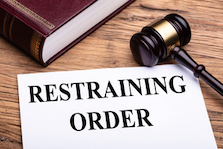Restraining Orders


Your safety and the safety of your loved ones is paramount. If you, or someone you know, is being harassed or abused, do not hesitate to contact an experienced attorney that can help you navigate the legal system. The lawyers at Bellotti Law Group, P.C. can assist you in seeking a restraining order. Additionally, there are many cases where the victim is the one who has been served a restraining order, due to petty domestic disputes or malicious intent. At Bellotti Law Group, P.C., we can help you seek justice and keep yourself and your loved ones safe. We have successful experience in helping file and defend against restraining orders. Call 617-255-2100 today for a free consultation.
What Are Restraining Orders?
Restraining orders are protective orders issued by the court that prohibits someone from being within a set distance of a person. This order also prohibits the restrained party from making eye contact with the person who filed the order. Basically, restraining orders instruct or prohibit a person from doing something. Restraining orders prevent abuse and protect the filer’s confidentiality. People that are victims of stalking, harassment, abuse or domestic violence often file restraining orders. Restraining orders vary from temporary to long term. Once a restraining order has been filed, the restrained party must adhere to the strict terms or they could face prosecution. Our criminal defense attorneys at Bellotti Law Group, P.C. know the rights and responsibilities both the recipient and the alleged abuser face. We understand that not all restraining orders are initiated for valid reasons. Restraining orders may be motivated by unrelated domestic disputes, as well as personal issues. Our firm has been in practice since 1989, and we have the experience you need to defend your rights. Restraining orders in Massachusetts are abuse prevention orders (209A order) or harassment prevention orders (258E). These orders have a number of differences, explained below and in more detail here.
What is an Abuse Prevention Order (209A)?
The majority of restraining orders in Massachusetts fall under the law M.G.L. c. 209A. 209A Orders protect the petitioner from abuse by a relative or household member. The defendant is refrained from contacting, abusing, or living with the petitioner. This shields the petitioner from damage or the fear of harm induced by force. A 209A Order can also grant temporary custody of a minor child to the petitioner. M.G.L. c. 209A defines this order, which is also known as a restraining order or a 209A protective order. An abuse prevention order can be sought against a husband, ex-spouse, blood or marriage related, present or former household member, or someone with whom you had a substantial romantic connection. An abuse prevention order is valid for one year and may be extended at a later date pending a hearing. If the alleged victim is neither a family member nor household member, they must apply to the Superior Court for injunctive orders. Non-family members have the ability to obtain "harassment prevention orders'' pursuant to Ch. 258E, discussed in more detail below.
What is a Harassment Prevention Order (258E)?
A Harassment Prevention Order, or 258E Order, is designed to prevent you from being harassed. If you or someone you know possesses proof that a defendant committed three or more intentional and malicious acts that were meant to (and did) cause fear, intimidation, property damage, or abuse, then you are entitled to obtain this order. Harassment is defined by the law as the occurrence of one of the following events:
- Three or more acts of deliberate and malicious behavior directed against a specific person, with the goal to create fear, intimidation, abuse, or property damage
- A single act that forces someone to participate in sexual intercourse unwillingly due to force, threat, or duress
- One of the 12 enumerated offenses involving sexual assault, stalking, or harassment was committed in a single act.
How Do I File a Restraining Order?
If you want to apply for a 209A restraining order in Massachusetts, forms can be found online at mass.gov. You can also fill out a form at a local court or police station. Get in contact with one of our Boston restraining order attorneys to assist you in the process for the best possible outcome. The criminal defense lawyers at Bellotti Law Group, P.C. have helped clients file and defend restraining orders. We have offices in Boston, Cambridge, and Quincy. Call us today for a free consultation at 617-225-2100. You can also use our secure contact form.
Once a restraining order is issued your CORI (criminal) record will show its existence. Your criminal record is accessible by anyone. This includes potential employers, college officials, landlords, and loan officers. Once a valid restraining order is issued, the recipient has the ability to report a violation (including seeing or speaking with you), which subjects you to immediate arrest and criminal prosecution. Contact a lawyer at Bellotti Law Group, P.C. has experienced professional attorneys to help you with your case, and to defend your rights.
Effect of a 209A Restraining Order
A restraining order is a civil proceeding, signed by a judge, which grants protection for the recipient against an alleged abuser. A restraining order proceeding is a civil matter, between the alleged victim and the abuser. Although restraining order proceedings or a civil matter, violating a legitimate restraining order is a criminal offense. Restraining orders are issued to prevent: annoying, harassing, following, having contact with, calling, writing, or coming within a certain number of feet of a person's work, school, or home. Restraining orders has the ability to affect child custody, living arrangements, child support, and ownership of weapons. After a restraining order is filed, issued, and served on the alleged abuser (defendant), the terms of the order must not be violated, regardless of whether the restraining order is temporary or permanent. A restraining order violation can result in jail time of up to 2 1/2 years and a $5,000 fine.
Ex Parte Temporary Restraining Order Hearings
Most applicants for restraining orders appear in court alone, or "ex-parte," to testify before a judge as to why a restraining order should be issued. It is important to note that the defendant does not need to be notified of this hearing. At the hearing, the plaintiff will file an affidavit which outlines the reasons for the restraining order request. The court will then decide if the plaintiff has shown, by a "preponderance of the evidence" (at least 51% likely), that a substantial likelihood of imminent danger of abuse exists. If so, a temporary restraining order will be issued. At this time, the defendant, even if aware of the temporary restraining order hearing, cannot challenge the plaintiff. 10 days after the issuance of a temporary order, a hearing for a permanent restraining order takes place. At the permanent restraining order hearing, the defendant can respond to the allegations.
Hearing for a Permanent Restraining Order
After notice is given to the defendant of the temporary order, a permanent order hearing is held to determine if the restraining order will be extended for one year. The defendant can offer testimony, cross-examine the plaintiff, and/or call supporting witnesses. If the plaintiff does not appear, the temporary order will expire that day. At this hearing, it is very helpful to have an attorney from Bellotti Law Group, P.C. speak on your behalf and examine the plaintiff's affidavit.
Appeals of 209A Restraining Orders
Once a restraining order is issued against you, there is only one avenue of appeal, which is petitioning a single justice of the Massachusetts Supreme Judicial Court (SJC) for relief under M.G.L. c. 211, section 3. The criminal defense lawyers at Bellotti Law Group, P.C. have helped countless clients file and defend restraining orders and harassment prevent orders in courts throughout Massachusetts. We have offices in Boston, Cambridge, and Quincy. Call us today for a free consultation at 617-225-2100. You can also use our secure contact form.
Can Victims of Abuse, Such as Domestic Violence, Receive Time off of Work?
Yes. The Domestic Violence Leave Act allows qualifying employees up to 15 days of leave during any 12-month period for a qualifying purpose arising from abusive behavior. An employee must exhaust all available leave (e.g., sick leave and vacation) before the employee may take advantage of this leave. This leave is unpaid. For more information visit our Domestic Violence Leave Act page.
Case Results
Restraining order dismissed in Dedham District Court
Restraining order vacated in Malden District Court
Restraining order vacated in Quincy District Court
Restraining order dismissed in Hingham District Court
Restraining order dismissed in Somerville District Court

Call Us. We are Here to Help! Contact a Massachusetts Restraining Order Attorney Today
If you have violated a restraining order, you need the services of a professional defense attorney with successes in fighting against criminal charges in Massachusetts. Criminal charges are life-altering, and impact not only you, but the people around you. Don’t risk going to court alone. The law offices of Bellotti Law Group P.C. are committed to helping your case. Contact an experienced lawyer at Bellotti Law Group, P.C. to help you. Call 617-255-2100 for a free consultation.
- Fighting a False Restraining Order in Massachusetts
- How Do I Fight a Harassment Prevention Order in Massachusetts?
- Should I Fight a Restraining Order in Massachusetts?
- What are Grounds for a Restraining Order in Massachusetts?
- What is the Difference Between an Abuse Prevention Order and a Harassment Prevention Order?
- Domestic Violence Leave Act
 Bellotti Law Group, P.C. Home
Bellotti Law Group, P.C. Home



